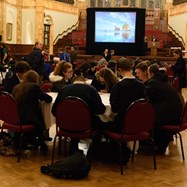UK and EU must remain ambitious on science and education
02 March 2018
Russell Group's Head of Policy, Jessica Cole, reflects on the PM’s latest Brexit speech and urges both sides to make progress on citizens’ rights and science and education co-operation as the negotiations enter their next crucial phase
It is a critical time in the Brexit negotiations. With the clock ticking and just over a year to go until the UK is due to leave the EU, both sides need to move quickly to clarify the terms of the transition period and set out a clearer vision for the future relationship between the UK and the EU. During this week of Brexit speeches, speculations and policy statements we have some new information. But there is a long way to go in establishing and agreeing exactly what a “unique and unprecedented partnership” will entail.
For the first time, Theresa May conceded that we cannot get everything we want for the negotiations. So now is the time for the Government to spell out clearly what its priorities are. The Prime Minister made a welcome (albeit fleeting) reference to science, innovation and education in her speech. We want to see continued cooperation in these areas at the top of the agenda for the next phase of talks. This is not only important for universities, students and scientists, but is essential if the Prime Minister is to realise her vision for the UK as "a nation of pioneers, innovators, explorers and creators”.
Citizens’ rights
There are around 26,500 members of staff from other EU countries working at Russell Group universities (accounting for nearly a quarter of our academics). They play a crucial role in producing high-quality research, driving new innovations and training the next generation of entrepreneurs, leaders and inventors in the UK. The 71,000 EU-nationals studying at our universities also bring diverse new ideas, cultures and ways of working which enhance the learning experience for UK students. Those European students who stay in the UK after graduation help meet demand in the UK labour market and address skills shortages in key areas.
The EU-UK joint report published in December contained welcome statements that EU nationals who are in the UK before Brexit, including staff and students at our universities, will be able to register for settled status using a fast, user-friendly system. The Prime Minister emphasised today that EU citizens are an integral part of our economic, cultural and social fabric. She should act now to provide the necessary legal certainty for these citizens by incorporating the provisions of the joint report on their rights into UK legislation as soon as possible.
This week the Government published a policy statement confirming its intention that EU citizens and their family members will be able to move to the UK during the transition period on the same basis as they do today and that “there will be no new constraints on working or studying in the UK in the implementation period”. We hope the Government will confirm that this will mean EU students starting courses at UK universities during this period will remain eligible for home fee rates and able to access loans and grants as they do now. The sooner clarity can be provided on this the better so that students and universities can plan ahead confidently.
Science, innovation and education cooperation
The EU’s research and innovation programmes and the Erasmus programme have allowed students, researchers and universities to build critical networks and collaborative links between the UK and the rest of the EU.
The Russell Group welcomed the statements in the EU-UK joint report which confirmed that the UK will be able to participate in EU programmes including Horizon 2020 until the end of 2020. The UK Government and the EU need to promote this as clearly and loudly as possible to reassure organisations in the EU that they can work with UK partners with confidence and encourage those in the UK to keep applying for funding.
The Prime Minister reiterated today her intention to secure a far-reaching science and innovation pact with the EU which would enable us to participate in key programmes, including education and cultural programmes. As the next round of negotiations begin, securing a high-level agreement on continued academic and scientific cooperation between the UK and the EU as early as possible will help set a positive tone about the importance of collaboration in this area and would have mutual benefits to both the UK and the EU.
Indeed, Michel Barnier has indicated the EU would be would be ready to strike an “ambitious partnership” with UK, including on research cooperation between universities and access to the Erasmus+ mobility programme. And last week the UK’s Science Minister Sam Gyimah said that “an official agreement between the UK and the EU, I believe, would be a win-win allowing ongoing collaboration through an established, effective mechanism provided that we maintain the shared focus on excellence”.
The Prime Minister openly acknowledged the complexity of the task ahead and the next few months will be crucial. With so many contentious and difficult issues to resolve, getting an early agreement on science, innovation and education cooperation would be a win-win outcome that both sides should be able to agree.
-
Jessica Cole
jessica.cole@russellgroup.ac.uk
020 3816 1305
 X
X


